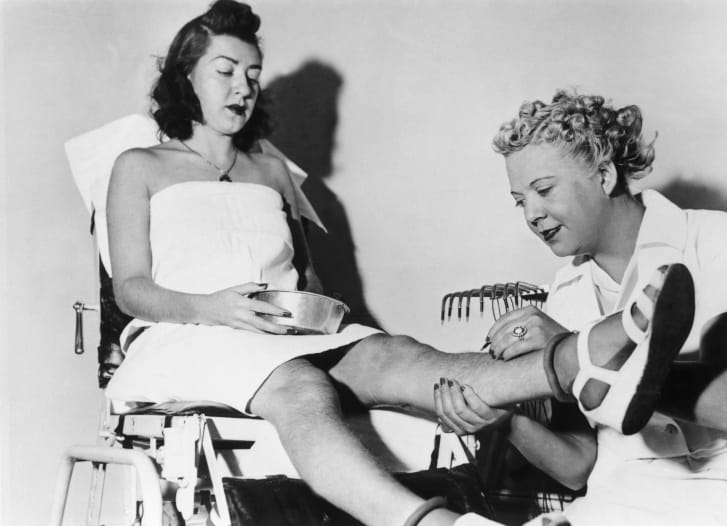Switch from disposable tampons and pads to Beppy! Experience ultimate comfort, hygiene, convenience, and sustainability.

Shaving, waxing or the removal of body hair, has functioned as a signifier of class, defined notions of femininity and “the ideal body”, and has long shaped gender dynamics.
Today, there is a stigmatisation of NOT SHAVING and shame has been added to the formula. Today, most women feel that we must shave. It seems to be the only socially accepted option. Those times that I have not waxed, (both men and women) have said to me in multiple occasions: ‘You have more hair than a man’, or. It’s time to shave, isn’t it?’ and even ‘Not shaving your armpits or legs is unhygienic’.
So I started thinking… Where does ALL this come from? Why do I feel ashamed when I don’t shave?
I don’t know about you, but I do NOT like to shave at all times. So I started researching why waxing exists in our society.
I typed into Google “when did women start to ….” and my second search suggestion was “When did women start to wax”.
And it seems that the removal of our body hair goes back CENTURIES!
Waxing didn’t become a normatively feminine act until the early 20th century, before that the story was VERY DIFFERENT:
Removing body hair was something both women and men did in the Stone Age, through ancient Egypt, Greece and the Roman Empire. ‘In ancient Rome they also associated it with class: the smoother your skin, the purer and more superior you were.’ And how did they shave in the past? Using beeswax, seashells or other methods of depilation.
In Persia on the other hand, depilation was an indicator of adulthood and marriage for women. On the other hand, in China as in other Asian countries, body hair was considered normal for a long time, and even today women do not face as much social pressure to shave as in the West.
No, in the Middle Ages both Europeans and Americans expected Catholic women to grow their hair as a sign of femininity, as long as they kept it hidden from the public.
In the late 19th century, women in the West began to include hair removal as an essential beauty routine. At the time, Darwin’s theory of natural selection, which associated body hair with “primitive ancestry and ‘less developed forms’, was spreading. While being hairless was a sign of being more evolved and sexually attractive, says Rebecca Hertig, an expert on gender and sexuality. As Darwin’s ideas became popularised and scientists linked hair to ‘what was once known as sexual inversion’, pathology of disease, madness and criminal violence,” says Hertig.
Interestingly, such connotations were mostly applied only to women’s body hair, not only because of evolutionary arguments, but also to enforce a “gendered social control” over the growing role of women in society, the author noted. Society grew the idea that women should shave their hair to be ‘feminine’ and ‘dignified’ and of course not to be shamed.
Later, in the early 20th century, the idea became more common among middle and upper class white American women that shaving was an indicator of femininity. Hair on a woman’s body was associated with something disgusting. So removing them offered “a way of separating oneself from the more vulgar, lower-class, immigrant people,” Herzig wrote.
And then in the early 1900s, new trends such as shorter dresses and sleeves further popularised body hair removal in the US….
But it doesn’t stop there, the media and companies continued the same discourse and used it to market hair removal, describing it as ‘a necessity’, ‘hygiene’ and ‘a sign of femininity’. And while this is still happening today, in its most recent evolution, we are making body hair a sign of PERSONAL STRENGTH and not a sign of shame.
If you’re interested, I’ll talk about all this in our next Blog: When did women start shaving? – History of depilation Part 2
€36,95
* Prices incl. VAT, Shipping costs€39,99
* Prices incl. VAT, Shipping costs€34,95
* Prices incl. VAT, Shipping costsLooks like you haven't made a choice yet.